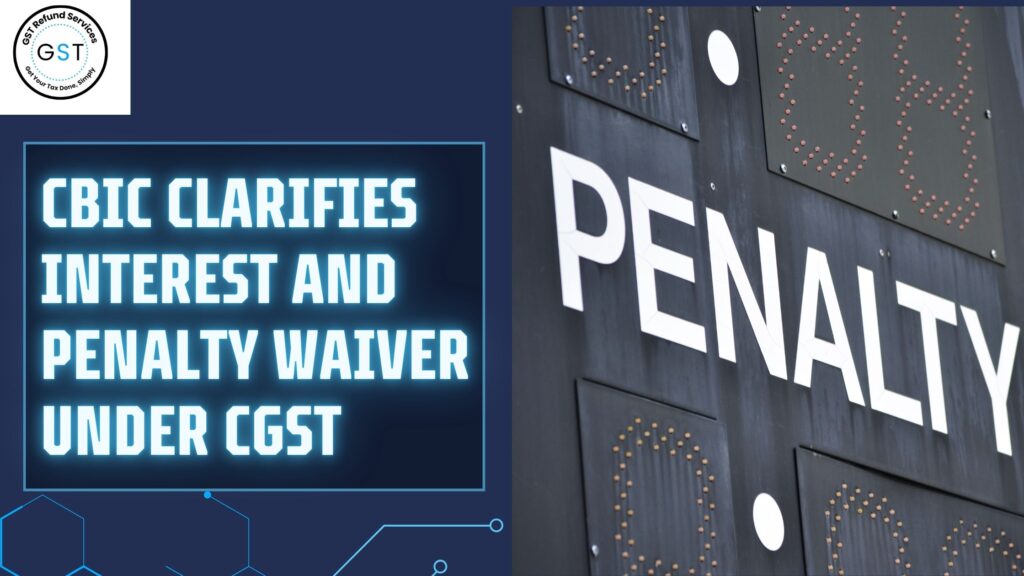
CBIC Clarifies Waiver of Interest & Penalty Under CGST Act
On November 1, 2024, the CBIC implemented Section 128A under the CGST Act. Subject to certain requirements, this section provides substantial relief to taxpayers by waiving interest and penalties on demands made under Section 73 for the fiscal years 2017–18, 2018–19, and 2019–20. To be eligible for the waiver, taxpayers must pay the entire amount of taxes due before March 31, 2025. The process to apply for this relief is described in the recently established Rule 164.
Important Conditions for Waiver of Interest & Penalty
1 Complete Tax Payment Is Required: The taxpayer must pay the full tax amount specified in the notice, statement, or order in order to be eligible for the waiver. Waivers in part are prohibited.
2 Payment Schedule: In the event that a tax officer redetermines the demand, the payment has to be made within six months of the date the redetermination order was issued.
3 Exclusions:
a. Late fines and penalties unrelated to tax requests are not covered by the waiver.
b. Interest on self-assessed obligations or returns that are filed beyond the due date is not included.
Application and Processing
For taxpayers to take advantage of the waiver, they must do the following:
Apply by Circular No. 238/32/2024-GST’s instructions.
Make sure that the deadlines finish every payment.
The taxpayer must withdraw their petitions before applying in cases where the Supreme Court is still in dispute.
Input Tax Credit (ITC) can be used to make payments, and tax officers can use the money they recover on behalf of the taxpayer to offset the tax that is being sought. Nevertheless, penalties or interest that have already been paid cannot be changed.
Key Clarifications from CBIC Circular 238/32/2024-GST
The October 15, 2024, CBIC circular provides detailed instructions on how taxpayers can complete the CGST Act’s interest and penalty waiver process. Important clarifications include of:
- Application Process: Depending on their unique situation, taxpayers must submit their waiver application using either FORM GST SPL-01 or FORM GST SPL-02, depending on the format.
- Flexibility in Payment: Taxpayers can more easily and flexibly comply with the waiver’s payment criteria by using their Input Tax Credit (ITC) to make the required payments.
- Third-Party Payments: The total tax payment needed for the Section 128A waiver application will include any sums tax authorities have collected from third parties on the taxpayer’s behalf.
- Exclusions: It’s crucial to remember that obligations resulting from the Customs Act, late fines, and penalties unrelated to the tax demand are not eligible for the waiver under this clause.
Procedural Details under Rule 164
With the introduction of Rule 164 on November 1, 2024, additional procedural requirements are outlined:
- Payment Deadline: Taxpayers must settle all tax payments within three months after receiving an order for waiver approval. Failing to do so will result in the forfeiture of the waiver benefits, underscoring the importance of adhering to strict timelines.
- Supreme Court Cases: For cases involving pending appeals in the Supreme Court, taxpayers must withdraw any Special Leave Petitions (SLPs) before they can submit their waiver request.
- Tax Demands Post-Order: Any additional tax demands issued by appellate authorities must be cleared within three months from the date of such orders. Delays beyond this period will invalidate the waiver.
Key Takeaways
The CGST Act’s new provision waiving interest and penalties provides a methodical way to effectively settle tax disputes. To take advantage of the waiver, taxpayers must follow the requirements, deadlines, and application procedures. For taxpayers with outstanding obligations under Section 73 for previous fiscal years, this provision offers much-needed relief and streamlines compliance.


